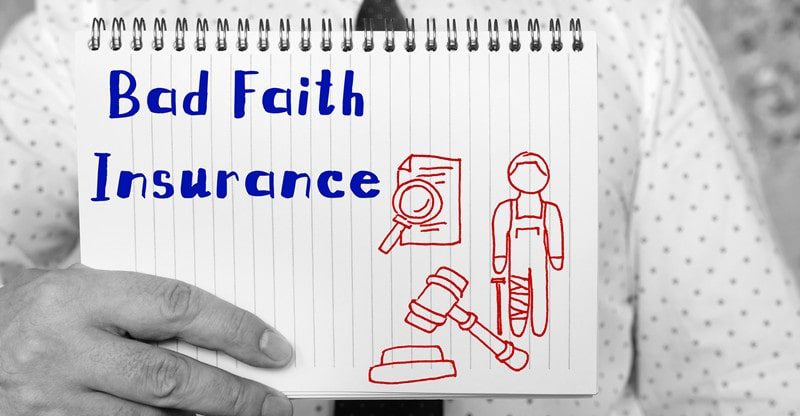Injury Lawyers Expose Bad Faith Insurance You Should Watch Out
Insurance companies offer financial protection for accidents or injuries through compensation covering medical expenses, lost wages, and other related costs. However, some insurance companies engage in deceptive practices that undermine claimants’ rights despite their obligation to act in good faith.
The prevalence of bad faith practices in insurance companies has become increasingly common, with many individuals experiencing unfair treatment when seeking compensation for their injuries.
For those seeking justice and fair compensation following an injury, injury lawyers Edmonton can provide invaluable assistance and legal representation.
Key Takeaways:
- Insurance companies must provide clients with financial protection.
- Bad faith practices are increasingly common among insurance companies.
- Many people endure unfair treatment and unjust settlements due to bad faith.
Bad Faith Defined
Bad faith refers to actions by an insurer that intentionally disregard their obligations under the insurance contract, such as failing to investigate claims or withholding pertinent information.
Tactics like delaying settlement negotiations or concealing contract terms undermine the principle of good faith required in insurance agreements.
What Constitutes Bad Faith
Unreasonable Delay
Insurance companies must promptly approve medical treatment requests when doctors deem them necessary, and delays can lead to bad faith claims. For instance, a bad faith claim may be justifiable if a recommended surgery is not approved or denied without reason after three months.
Incomplete Investigation
Insurance companies must thoroughly investigate valid claims from policyholders. For example, if a homeowner’s insurance denies a fire claim without adequately investigating the cause or coverage owed, it could be considered bad faith.
Denial of Valid Claims
Insurers must provide reasons for claim denials. If a valid claim is denied without explanation or for an invalid reason, contacting an insurance bad faith lawyer may be necessary. An example of bad faith is a denial in the absence of a rationale for a valid claim for vehicle repairs post-accident.
Failure to Communicate
Insurance companies often fail to communicate effectively with policyholders, hindering informed decisions and leading to frustration. This lack of communication breaches the duty of good faith and may warrant a claim for bad faith.
Misrepresentation
Insurance companies may undervalue policyholders’ claims, offering less than they are worth. Deliberately making lowball offers constitutes bad faith. For example, if an insurer provides significantly less than reasonable medical bills despite having coverage, it demonstrates bad faith.
Breach of Contract
Insurance companies breach their contractual obligations by unreasonably denying valid claims without basis, causing financial losses and emotional distress for policyholders. Seeking assistance from a bad faith insurance lawyer is crucial in such cases.
Intimidation or Coercion
Insurance companies should refrain from making threatening statements towards policyholders. For example, accusing a homeowner of arson or fraud while threatening police involvement constitutes bad faith and requires immediate legal assistance.
Unfairly Evaluating Damages
Insurance companies engage in bad faith by undervaluing property damage or downplaying bodily injuries, resulting in inadequate compensation for policyholders. This action violates the fundamental principle of insurance contracts.
Retaliation
Insurers may act in bad faith by unfairly delaying or denying claims, harassing policyholders, threatening policy cancellation, or increasing premiums as punishment for filing a claim. These actions breach the duty of good faith and fair dealing and may warrant legal action.
Case Digests
Campbell v. State Farm Mutual Automobile Insurance
After a fatal car collision, State Farm rejected a settlement offer despite their adjuster finding Mr. Campbell at fault. Raymond Summers, the adjuster, admitted under oath to deceptive practices over his 19-year tenure.
State Farm engaged in bad faith litigation, including fighting reasonable requests and destroying documents, as outlined in their “excess liability handbook.”
Despite claiming ignorance, evidence showed complicity in Summers’s unethical behaviour. The jury awarded Mr. Campbell $145 million in punitive damages.
Middler v. State Farm Insurance Companies
Ronald S. Middler, a former State Farm employee of over 25 years, filed a complaint in 1993 after being demoted.
He exposed the company’s discriminatory practices, mainly through its Special Investigation Unit (SIU), which handled claims from minorities and intentionally delayed settlements to minimize payouts.
Middler provided evidence of unethical behaviour, including document destruction and prioritizing profits over client welfare.
Insurer’s Liability for Bad Faith
In bad faith cases, insurers found liable may face damages beyond policy limits, including judgments exceeding the policy, statutory penalties, interest, emotional distress, economic losses, legal fees, and punitive damages. Punitive damages in these cases consider the insured’s losses and the insurer’s financial status.
How To Be Protected From Bad Faith
- Document your complaint by writing to your claims handler and providing supporting evidence, such as past correspondence with your adjuster and relevant statements or receipts related to your lawsuit.
- Contact your state insurance department and provide them with details of your complaint. Doing this may prompt an investigation into your case, potentially resulting in fines or penalties if your insurer is acting negligently.
- Consult a local attorney for legal guidance on potential actions, including court proceedings. Legal options vary by jurisdiction, with some allowing only compensatory damages while others also permit seeking punitive damages.
Conclusion
Knowing the extent of your legal rights can help you better navigate the claims process and increase your chances of receiving fair compensation. Recognizing the deceptive tactics can empower you to assert your rights and hold insurers accountable for their actions.
For guidance and support in navigating insurance bad faith claims, consider contacting Sidhu Personal Injury Lawyers Edmonton.
Frequently Asked Questions
How can I gather evidence to support my bad faith claim against my insurance company?
- Documentation: Document all communications with the insurance company, including emails, letters, and phone calls.
- Policy Documents: Review your insurance policy and any related documents to understand the coverage you’re entitled to and the insurance company’s obligations.
- Claim File: Get a copy of your claim file from the insurance company, including correspondence, investigation reports, and claim assessments.
- Witness Statements: Gather statements from witnesses to the events leading to your claim.
- Expert Opinions: If necessary, seek opinions from relevant experts to support your claim.
- Legal Advice: Consult a lawyer specializing in bad faith insurance claims.
Is dealing with bad faith by insurance companies more challenging without a lawyer?
Dealing with bad faith by insurance companies can be more challenging without a lawyer. Insurance companies have legal teams and extensive resources to protect their interests, making it difficult for an individual to navigate the complexities of the legal system on their own.
What are some benefits of hiring a lawyer to handle a bad faith claim against an insurance company?
- Legal Expertise: Lawyers specializing in bad faith claims have extensive insurance law and regulations knowledge.
- Case Evaluation: A lawyer can evaluate the strength of your bad faith claim and determine the best course of action to increase your chances of success.
- Evidence Gathering: Lawyers have the resources and experience to gather evidence to support your bad faith claim.
- Court Representation: If necessary, a lawyer can represent you in court proceedings.
- Stress Reduction: Dealing with insurance companies can be stressful and overwhelming, especially when facing unfair treatment.



